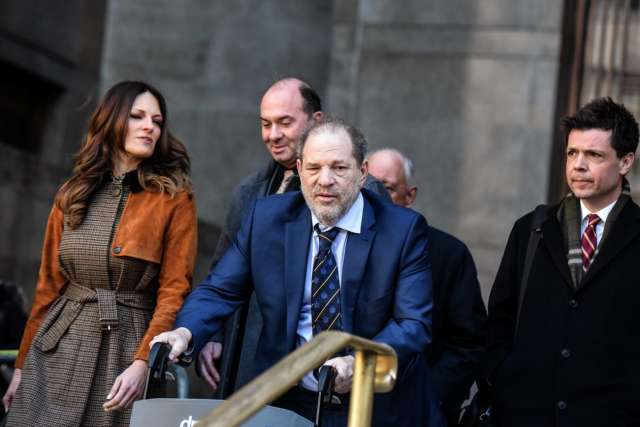Media
Harvey Weinstein's lawyer keeps talking to the media, and the judge is furious. What's she playing at? – National Post

NEW YORK — For the second time in recent weeks, Harvey Weinstein’s main defence lawyer has bypassed the courtroom and instead turned her attention to the court of public opinion — and the judge is not impressed.
On Tuesday, Justice James Burke, presiding over the movie mogul’s rape case, warned Donna Rotunno that she must not talk to the press until the jury has reached a verdict, two days after the attorney wrote an opinion piece in Newsweek magazine about the case.
“I would caution you about the tentacles of your public relations juggernaut,” Justice Burke told Rotunno.
Rotunno told Burke that the opinion piece, published on Saturday and titled “Jurors in my client Harvey Weinstein’s case must look past the headlines,” was not intended to address the jury directly.
“This is an op-ed about the jury system as a whole, about the criminal justice system as a whole,” she said.
Prosecutors on Tuesday asked Burke to revoke Weinstein’s bail and jail him, saying he must have approved the Newsweek opinion piece. The judge did not act on the request.
The dramatic exchange came as jurors in the case are expected to begin deliberating the former Hollywood producer’s fate.
And it’s not the first time that Rotunno media conduct has raised eyebrows; she previously caused a stir during an appearance on hit New York Times podcast The Daily, which was recorded on Jan. 28 and aired earlier this month. Her appearance then — and remarks — fit broadly with a pattern thus far put forward by Weinstein’s defenders: that whatever happened between the mogul and those accusing him was done with prior consent, and that the furore surrounding the #MeToo movement has warped public perception of Weinstein.
During that appearance on The Daily, Rotunno suggested that “we (the public) have created a society of celebrity victimhood status.”
When asked late on in that appearance if she herself had ever been sexually assaulted in her life, she replied:
“I have not. Because I would never put myself in that position.”
The remarks angered many in the public and also prosecutors on the Weinstein case, who asked at that point that Rotunno be told to cease her actions by Justice Burke.
“I have not spoke to anyone in the media. Have not spoke to anyone since we started this case. That was taped a while ago, and I did not speak about any witness individually. I talked about a multitude of issues with regard to questions that were asked of me. It was done — it was really me going into the lion’s den, not the other way around.”
Movie producer Harvey Weinstein departs his sexual assault trial at New York Criminal Court with his lawyer Donna Rotunno (L) on February 14, 2020 in New York City.
Assault
Weinstein has pleaded not guilty to sexually assaulting former production assistant Mimi Haleyi in 2006 and raping Jessica Mann, a onetime aspiring actress, in 2013.
Weinstein faces life in prison if convicted on the most serious charge, predatory sexual assault.
A unanimous verdict is needed for a conviction.
Since 2017, more than 80 women have accused Weinstein of sexual misconduct. Weinstein, who was behind films including “The English Patient” and “Shakespeare in Love,” has denied the allegations and said any sexual encounters were consensual.
The allegations fuelled the #MeToo movement, in which women have accused powerful men in business, entertainment, media and politics of sexual misconduct.
Last week, jurors heard closing arguments from lawyers on both sides. Defence attorney Rotunno argued that the encounters had been consensual, pointing to friendly communications from the women to Weinstein after they were allegedly assaulted. She assailed the credibility of the accusers and urged the jury to put aside their emotions and use common sense in evaluating the evidence.
“Historically, you are the last line of defence in this country from the overzealous media, from the overzealous prosecution,” Rotunno said.
Assistant District Attorney Joan Illuzzi urged jurors to convict Weinstein, saying the once-powerful producer used his position in the film industry to prey on women and that those who testified against him had no reason to lie.
Illuzzi said Weinstein had counted on his victims never coming forward.
“The defendant not only ran roughshod over the dignity and the very lives of these witnesses, but he also underestimated them,” she told the jury.
Haleyi testified during the trial that Weinstein forced oral sex on her in his home in 2006. Haleyi said Weinstein “lunged” at her, backed her into a bedroom and forcibly performed oral sex on her, yanking out her tampon.
Mann testified that Weinstein raped her in a Manhattan hotel room early in what she called an “extremely degrading” relationship with him.
Jurors heard from four other women, including actress Annabella Sciorra, who testified that Weinstein came into her apartment one winter night in 1993 or 1994 and raped her. The accusation is too old to be charged as a separate crime, but it could act as an aggravating factor to support the predatory sexual assault charge.
Prosecutors called the remaining three women to bolster their evidence of Weinstein’s intent, but did not charge him with any crimes related to them. Weinstein is separately charged with assaulting one of them, Lauren Young, by prosecutors in Los Angeles.
— with files from National Post staff
Media
Trump could cash out his DJT stock within weeks. Here’s what happens if he sells
Former President Donald Trump is on the brink of a significant financial decision that could have far-reaching implications for both his personal wealth and the future of his fledgling social media company, Trump Media & Technology Group (TMTG). As the lockup period on his shares in TMTG, which owns Truth Social, nears its end, Trump could soon be free to sell his substantial stake in the company. However, the potential payday, which makes up a large portion of his net worth, comes with considerable risks for Trump and his supporters.
Trump’s stake in TMTG comprises nearly 59% of the company, amounting to 114,750,000 shares. As of now, this holding is valued at approximately $2.6 billion. These shares are currently under a lockup agreement, a common feature of initial public offerings (IPOs), designed to prevent company insiders from immediately selling their shares and potentially destabilizing the stock. The lockup, which began after TMTG’s merger with a special purpose acquisition company (SPAC), is set to expire on September 25, though it could end earlier if certain conditions are met.
Should Trump decide to sell his shares after the lockup expires, the market could respond in unpredictable ways. The sale of a substantial number of shares by a major stakeholder like Trump could flood the market, potentially driving down the stock price. Daniel Bradley, a finance professor at the University of South Florida, suggests that the market might react negatively to such a large sale, particularly if there aren’t enough buyers to absorb the supply. This could lead to a sharp decline in the stock’s value, impacting both Trump’s personal wealth and the company’s market standing.
Moreover, Trump’s involvement in Truth Social has been a key driver of investor interest. The platform, marketed as a free speech alternative to mainstream social media, has attracted a loyal user base largely due to Trump’s presence. If Trump were to sell his stake, it might signal a lack of confidence in the company, potentially shaking investor confidence and further depressing the stock price.
Trump’s decision is also influenced by his ongoing legal battles, which have already cost him over $100 million in legal fees. Selling his shares could provide a significant financial boost, helping him cover these mounting expenses. However, this move could also have political ramifications, especially as he continues his bid for the Republican nomination in the 2024 presidential race.
Trump Media’s success is closely tied to Trump’s political fortunes. The company’s stock has shown volatility in response to developments in the presidential race, with Trump’s chances of winning having a direct impact on the stock’s value. If Trump sells his stake, it could be interpreted as a lack of confidence in his own political future, potentially undermining both his campaign and the company’s prospects.
Truth Social, the flagship product of TMTG, has faced challenges in generating traffic and advertising revenue, especially compared to established social media giants like X (formerly Twitter) and Facebook. Despite this, the company’s valuation has remained high, fueled by investor speculation on Trump’s political future. If Trump remains in the race and manages to secure the presidency, the value of his shares could increase. Conversely, any missteps on the campaign trail could have the opposite effect, further destabilizing the stock.
As the lockup period comes to an end, Trump faces a critical decision that could shape the future of both his personal finances and Truth Social. Whether he chooses to hold onto his shares or cash out, the outcome will likely have significant consequences for the company, its investors, and Trump’s political aspirations.

Media
Arizona man accused of social media threats to Trump is arrested

Cochise County, AZ — Law enforcement officials in Arizona have apprehended Ronald Lee Syvrud, a 66-year-old resident of Cochise County, after a manhunt was launched following alleged death threats he made against former President Donald Trump. The threats reportedly surfaced in social media posts over the past two weeks, as Trump visited the US-Mexico border in Cochise County on Thursday.
Syvrud, who hails from Benson, Arizona, located about 50 miles southeast of Tucson, was captured by the Cochise County Sheriff’s Office on Thursday afternoon. The Sheriff’s Office confirmed his arrest, stating, “This subject has been taken into custody without incident.”
In addition to the alleged threats against Trump, Syvrud is wanted for multiple offences, including failure to register as a sex offender. He also faces several warrants in both Wisconsin and Arizona, including charges for driving under the influence and a felony hit-and-run.
The timing of the arrest coincided with Trump’s visit to Cochise County, where he toured the US-Mexico border. During his visit, Trump addressed the ongoing border issues and criticized his political rival, Democratic presidential nominee Kamala Harris, for what he described as lax immigration policies. When asked by reporters about the ongoing manhunt for Syvrud, Trump responded, “No, I have not heard that, but I am not that surprised and the reason is because I want to do things that are very bad for the bad guys.”
This incident marks the latest in a series of threats against political figures during the current election cycle. Just earlier this month, a 66-year-old Virginia man was arrested on suspicion of making death threats against Vice President Kamala Harris and other public officials.
Media
Trump Media & Technology Group Faces Declining Stock Amid Financial Struggles and Increased Competition

Trump Media & Technology Group’s stock has taken a significant hit, dropping more than 11% this week following a disappointing earnings report and the return of former U.S. President Donald Trump to the rival social media platform X, formerly known as Twitter. This decline is part of a broader downward trend for the parent company of Truth Social, with the stock plummeting nearly 43% since mid-July. Despite the sharp decline, some investors remain unfazed, expressing continued optimism for the company’s financial future or standing by their investment as a show of political support for Trump.
One such investor, Todd Schlanger, an interior designer from West Palm Beach, explained his commitment to the stock, stating, “I’m a Republican, so I supported him. When I found out about the stock, I got involved because I support the company and believe in free speech.” Schlanger, who owns around 1,000 shares, is a regular user of Truth Social and is excited about the company’s future, particularly its plans to expand its streaming services. He believes Truth Social has the potential to be as strong as Facebook or X, despite the stock’s recent struggles.
However, Truth Social’s stock performance is deeply tied to Trump’s political influence and the company’s ability to generate sustainable revenue, which has proven challenging. An earnings report released last Friday showed the company lost over $16 million in the three-month period ending in June. Revenue dropped by 30%, down to approximately $836,000 compared to $1.2 million during the same period last year.
In response to the earnings report, Truth Social CEO Devin Nunes emphasized the company’s strong cash position, highlighting $344 million in cash reserves and no debt. He also reiterated the company’s commitment to free speech, stating, “From the beginning, it was our intention to make Truth Social an impenetrable beachhead of free speech, and by taking extraordinary steps to minimize our reliance on Big Tech, that is exactly what we are doing.”
Despite these assurances, investors reacted negatively to the quarterly report, leading to a steep drop in stock price. The situation was further complicated by Trump’s return to X, where he posted for the first time in a year. Trump’s exclusivity agreement with Trump Media & Technology Group mandates that he posts personal content first on Truth Social. However, he is allowed to make politically related posts on other social media platforms, which he did earlier this week, potentially drawing users away from Truth Social.
For investors like Teri Lynn Roberson, who purchased shares near the company’s peak after it went public in March, the decline in stock value has been disheartening. However, Roberson remains unbothered by the poor performance, saying her investment was more about supporting Trump than making money. “I’m way at a loss, but I am OK with that. I am just watching it for fun,” Roberson said, adding that she sees Trump’s return to X as a positive move that could expand his reach beyond Truth Social’s “echo chamber.”
The stock’s performance holds significant financial implications for Trump himself, as he owns a 65% stake in Trump Media & Technology Group. According to Fortune, this stake represents a substantial portion of his net worth, which could be vulnerable if the company continues to struggle financially.
Analysts have described Truth Social as a “meme stock,” similar to companies like GameStop and AMC that saw their stock prices driven by ideological investments rather than business fundamentals. Tyler Richey, an analyst at Sevens Report Research, noted that the stock has ebbed and flowed based on sentiment toward Trump. He pointed out that the recent decline coincided with the rise of U.S. Vice President Kamala Harris as the Democratic presidential nominee, which may have dampened perceptions of Trump’s 2024 election prospects.
Jay Ritter, a finance professor at the University of Florida, offered a grim long-term outlook for Truth Social, suggesting that the stock would likely remain volatile, but with an overall downward trend. “What’s lacking for the true believer in the company story is, ‘OK, where is the business strategy that will be generating revenue?'” Ritter said, highlighting the company’s struggle to produce a sustainable business model.
Still, for some investors, like Michael Rogers, a masonry company owner in North Carolina, their support for Trump Media & Technology Group is unwavering. Rogers, who owns over 10,000 shares, said he invested in the company both as a show of support for Trump and because of his belief in the company’s financial future. Despite concerns about the company’s revenue challenges, Rogers expressed confidence in the business, stating, “I’m in it for the long haul.”
Not all investors are as confident. Mitchell Standley, who made a significant return on his investment earlier this year by capitalizing on the hype surrounding Trump Media’s planned merger with Digital World Acquisition Corporation, has since moved on. “It was basically just a pump and dump,” Standley told ABC News. “I knew that once they merged, all of his supporters were going to dump a bunch of money into it and buy it up.” Now, Standley is staying away from the company, citing the lack of business fundamentals as the reason for his exit.
Truth Social’s future remains uncertain as it continues to struggle with financial losses and faces stiff competition from established social media platforms. While its user base and investor sentiment are bolstered by Trump’s political following, the company’s long-term viability will depend on its ability to create a sustainable revenue stream and maintain relevance in a crowded digital landscape.
As the company seeks to stabilize, the question remains whether its appeal to Trump’s supporters can translate into financial success or whether it will remain a volatile stock driven more by ideology than business fundamentals.
-

 News14 hours ago
News14 hours agoB.C. to scrap consumer carbon tax if federal government drops legal requirement: Eby
-

 Sports15 hours ago
Sports15 hours agoLawyer says Chinese doping case handled ‘reasonably’ but calls WADA’s lack of action “curious”
-

 News14 hours ago
News14 hours agoA linebacker at West Virginia State is fatally shot on the eve of a game against his old school
-

 Sports9 hours ago
Sports9 hours agoCanada’s Marina Stakusic advances to quarterfinals at Guadalajara Open
-

 News14 hours ago
News14 hours agoHall of Famer Joe Schmidt, who helped Detroit Lions win 2 NFL titles, dies at 92
-

 News15 hours ago
News15 hours agoRCMP say 3 dead, suspects at large in targeted attack at home in Lloydminster, Sask.
-
News24 hours ago
Local Toronto business story – Events Industry : new national brand, Element Event Solutions
-

 News15 hours ago
News15 hours agoProvinces decry Ottawa’s plan to resettle asylum seekers across the country




























